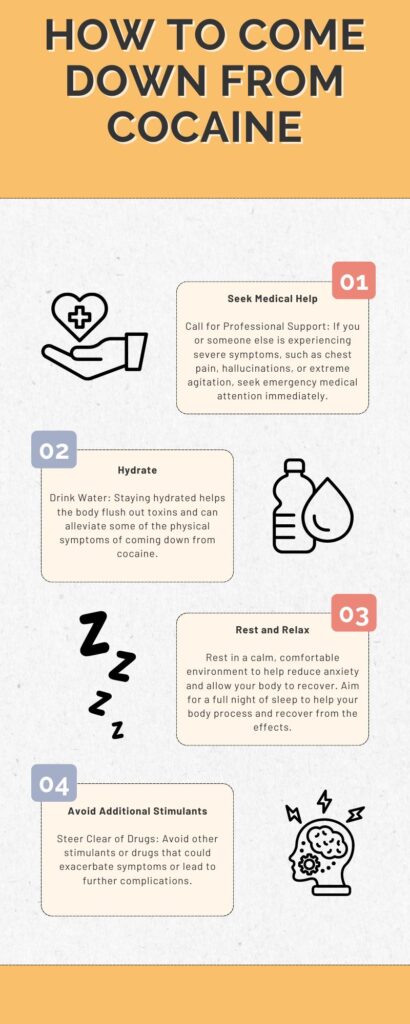Cocaine is a powerful stimulant that can lead to intense euphoria and energy, but coming down from it can be equally challenging and uncomfortable. In this blog, we’ll review how to come down from cocaine safely, as well as how to seek help for cocaine addiction.
Understanding the Cocaine Come Down
The comedown from cocaine can be marked by fatigue, depression, and irritability. This phase is characterized by a sharp decline in the stimulating effects of the drug, which can be both physically and mentally taxing.
How to Manage the Cocaine Come Down
- Stay Hydrated: Cocaine use can lead to dehydration. Drinking plenty of water helps rehydrate your body. Avoid caffeinated or alcoholic beverages, as these can exacerbate dehydration.
- Eat Nutritious Foods: Opt for balanced meals rich in vitamins and minerals. Eating fruits, vegetables, and lean proteins can help stabilize your mood and energy levels. Avoid sugary or highly processed foods that can lead to energy crashes.
- Rest and Recovery: Allow your body time to recover by getting plenty of rest. A calm and comfortable sleep environment is crucial for recuperating from the stimulating effects of cocaine. If you have trouble sleeping, consider relaxation techniques such as deep breathing or progressive muscle relaxation.
- Seek Professional Support: If the comedown is severe or if you experience intense cravings or emotional distress, seeking professional help is crucial. Medical professionals can provide medications and therapies to manage symptoms and prevent relapse.

Addressing Psychological Effects of a Cocaine Come Down
- Manage Mood Swings: The comedown from cocaine can bring on feelings of depression and anxiety. Engaging in calming activities, such as meditation or gentle exercise like yoga, can help stabilize your mood. Talking to a therapist or counselor can also provide valuable emotional support.
- Avoid Triggers: Identify and avoid situations or people that might trigger cravings or relapse. Surround yourself with supportive friends and family who understand your situation and can offer encouragement.
- Engage in Healthy Activities: Distracting yourself with positive activities can help you cope with the comedown. Consider hobbies, exercise, or creative outlets to keep your mind engaged and uplifted.
Long-Term Recovery Considerations
- Develop a Recovery Plan: After the immediate comedown, it’s important to create a plan for long-term recovery. This may include attending therapy, joining support groups, or seeking treatment for addiction.
- Build a Support Network: Surrounding yourself with a supportive network can significantly impact your recovery. Support groups, such as Narcotics Anonymous, can provide ongoing encouragement and accountability.
- Focus on Mental Health: Addressing any underlying mental health issues, such as depression or anxiety, is crucial for long-term recovery. Integrated treatment approaches that address both substance abuse and mental health are highly effective.
Seeking Cocaine Addiction Treatment
Coming down from cocaine can be challenging, but with the right strategies and support, you can manage the symptoms and start on the path to recovery. Remember that seeking professional help and building a strong support network are essential for achieving long-term success.
If you or someone you know is struggling with cocaine addiction, Ray Recovery is here to help. Our substance abuse treatment programs can help you or a loved one learn coping strategies, build life skills, and find support, all important components of a sustainable recovery journey. As part of our commitment to quality care, our programs are individualized to support the specific needs of each client. Contact our team to learn more about our cocaine rehab in Ohio.


